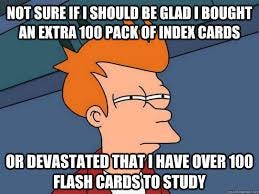Flashcards are stupid
You may be wasting your time
Welcome, aspiring polyglots! The most common question I get by far is, “Do you know any good apps for flashcards”, or some variation of that question. I have always struggled to answer because I have only ever used flashcards for memorization and regurgitation which I find to be ineffectual in language acquisition. However, just because it doesn’t work for me does not mean it is completely ineffective for everyone. Of course, there are some things you need to be aware of if you plan to use flashcards for languages.
The problem with flashcards
Flashcards and I have never been friends. They have just never been my preferred method for learning. Personally, I find hands on work to be the most beneficial. With that said, if you know for a fact that flashcards work for you, then by all means continue to use them. If, however, you have been using flashcards and you still feel like you are not able to remember the things you are learning, then I think I have some things that may help you.
First, I don’t think flashcards are completely useless. There are several scenarios where they are more than useful. Unfortunately, they are not very good for language. The primary reason they don’t work for languages is because the answer to the question “what does x word mean?” is often, “that depends”. Trying to memorize words out of context will lead to problems later down the road when you inevitably encounter the word somewhere that it doesn’t make sense given a particular translation.
Not only that, but during your daily interactions you are rarely going to be forced to encounter words out of context. If you train yourself to know words by sight instead of by context you may lose out on an invaluable tool that you can use indefinitely. Developing the ability to understand what you are seeing or hearing based on the context will make everything far easier. It is a muscle, though and you must train it up over time to get the most out of it.
It is impossible to learn a language through memorization alone and consuming the language in context is not enough. You can and must create with the language. The “hands-on” approach in language learning is the act of using the language. Learning where your weaknesses are in context. Finding out what you know well in context. Learning and using new words in context. Developing this skill takes time, but it will be well worth the effort.
Reading using context clues
Since you will almost never be faced with words in the abstract it is important for you to focus on how the words interact with one another. For example, the word “que” in Spanish does mean “that”, but it also means several other things. Even worse, the meaning can change based on the words that come before and after it. If all you do is flashcard words, you may end up trying to force in words that don’t belong because it’s what you wrote on the card.
Whether you like it or not, context is crucial for understanding language, so if you are going to use flashcards one of the best things you can do is flashcard phrases instead of single words. This will help you practice on different levels and since there are always more books with more complex diction and syntax for you to work into your personal arsenal. If nothing else, your study material should always be evolving to something more complex and challenging.
Making effective flashcards
It is possible to make effective flashcards, but they are far more labor intensive than the one time thing many people do. In order to make your flashcards effective you need to revisit the cards you have written consistently to continuously update them. There is no point in drilling the words you already know, so revisiting your cards and removing the ones that are too familiar is crucial to ensure you are no wasting time.
The last thing you want to be doing is live action Duolingo. For all intents and purposes Duolingo is a flashcard app and that is why so many people get so frustrated with the pacing. There really isn’t a mechanism that allows for you to add, remove, or advance faster than the predetermined pace of the app. That is why doing it yourself tends to work better, you can actually focus on your weaknesses rather than whatever was preprogrammed for you to do.
Once per week at a minimum you should be checking to make sure that you actually struggle with the words in your flashcards. Keep moving as quickly as possible because the momentum will eventually stagnate. This can be easier if you are writing simultaneously. Adding new words into your repertoire on a daily basis is all you really need to do is start using them and the easiest way to do that is through writing consistently.
Yes, learning new words and using them when talking is enjoyable and something you should be striving towards, it is rarely the first step. You should be adding new words that are related as well. If you are learning one word at a time you are doing things the hard way. More times than not there are words that use the same roots but will change their position and use in a sentence based on the prefixes and the suffixes.
Drilling those words all at the same time will give you the opportunity to learn how to place those specific words anywhere in a sentence. As you are going through them try creating a sentence or two with the words. Finally, learning phrases you can use instead of single words is likely far more beneficial. This is what Duolingo truly attempts to do, but, again, the pacing is entirely wrong for this to be effective.
If you want it to work you are going to need to maintain strict control over your schedule and ensure consistent progress. This is another reason why writing is so powerful. You are able to physically see with your own eyes just how much you have progressed. Watch as day after day you are able to use and recall the new words with ease. I harp on it all the time, but writing really is a super power when it comes to learning a new language.
Conclusion
At their core, I am not the biggest fan of flashcards, but there are ways to make and use them effectively. At the end of the day it is all about doing what works best for you and just because something doesn’t work for me doesn’t mean it is completely ineffectual for everyone. My goal is to give you as many strategies as possible to maximize your individual success. That means trial and error until you find what clicks for you. Remember, anon, n=1.
If, however, you do choose to use flashcards, make sure that you are not wasting your time by giving yourself a run through live action Duolingo. You need to be leveling up consistently and tossing cards as you learn the words on them. Wasting time reviewing things you already know can feel like a proper use of time, but at the end of the day it is holding you back more than it is helping you. Fight for every new addition to your vocabulary repertoire.
Requests
If you have anything you would like covered you can reach out to me on X, Instagram, or at odin@secondlanguagestrategies.com.
Additional Resources
Don't want to spend time playing catch up? Pick up the 3 Months to Conversational book now available on Amazon! 3 Months to Conversational
For more long form content be sure to check out the website!
Subscribe for new content on YouTube and TikTok!
Learning Spanish? We have begun aggregating resources in you Spanish Resource Newsletter!
Don't forget to pick up your very own French Language Logbook or Spanish Language Logbook!


![Shitpost] Just shove dem flashcards : r/Anki Shitpost] Just shove dem flashcards : r/Anki](https://substackcdn.com/image/fetch/$s_!5NCN!,w_1456,c_limit,f_auto,q_auto:good,fl_progressive:steep/https%3A%2F%2Fsubstack-post-media.s3.amazonaws.com%2Fpublic%2Fimages%2Fa1b1991c-0e6d-4abd-bc94-eeb6f33c7782_724x636.png)




